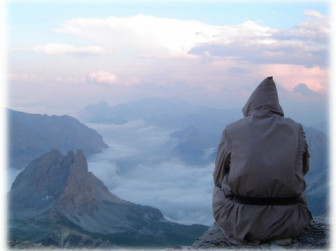based on the Guide Totus du scoutisme (Sarment, 2007) by Louis and Rémi Fontaine,
Article published in the magazine Europa scouts n°151, December 2023.
The way in which Scouts see each other as brothers, in the patrol, at camp, at school, in society and in the world at large, is not fictitious: it is the soul of Scout spirituality and the way of childhood.
The theme of fraternity is already very common in B.P.’s writings, as he defines Scouting as
a game in which older brothers or sisters have the opportunity to provide their cadets with a healthy environment, and to encourage them in a healthy activity that can help them develop their civic-mindedness.
This applies equally to the patrol leader and the troop leader, whom B.P. defines as a “man-child“. He must have “the soul of a boy”, be able to put himself on the same level as his boys and “love what they love“, as Don Bosco used to say. Learning to become a child again in order to teach children to become men. As a big brother can do, and as our “Brother and Leader Jesus Christ” taught us so well: “Unless you become like little children, you will not enter the Kingdom of Heaven” (Mt 18:3).
To love, to dare to love, to love everyone with the love of Jesus Christ Himself, it’s up to Him to teach us. In all our relationships, therefore, both outside and among ourselves, the most fraternal of charities must reign, first and foremost and at all costs. With the simplicity given to us by the great fraternity of the open air, courteous and binding, equal and benevolent, full of the peace and humility of the Sacred Heart. Like Jesus, we must be servants of all, like Saint Paul, “the last of the saints”, like Charles de Jesus (de Foucauld) “universal brothers” (“Father Sevin, Priestly Positions“).
So there is no gulf between the leader and the Scout, even if there is still a certain hierarchy, but a relationship of fraternal trust, a fraternal friendship that can be seen in the fact that people are on first-name terms with each other, whatever their age or rank in Scouting. This fraternity is lived out both horizontally and vertically, always from the fundamental perspective of the Scout salute (the thumb folded over the little finger): “the strongest protects the weakest”.
Once again, we must quote the Gospel:
Do not call yourselves rabbis, for you have only one master and you are all brothers (Mt 23:8).
This divine Master is the One who washed the feet of his apostles and calls them his friends, the Son of Man who, in order to save men, that is, to educate them, “is not ashamed to call them his brothers” (Heb 2:11), the Big Brother and the Leader par excellence!
The troop leader and patrol leader (right up to the “der de pat”) must imitate: “The Scout is made to serve and save his neighbour“. We are at the very heart of Scout spirituality, the universal brotherhood, already present in the very Christian message of Baden-Powell, but explained in its fullness by Father Sevin.
In the two volumes it has published, S’il plaît à Dieu toujours! and Seigneur et Chef! the Sainte-Croix de Riaumont sums up the thinking of its spiritual father, Jacques Sevin:
His spirituality does not distort scouting, it does not unbalance it, because it focuses precisely on its centre of gravity. The catholicisation of scouting is simply the clarification of its essential springs.
So yes, if every spirituality is a concrete way of practising the law of the Gospel, Scouting is also a spirituality that is embodied in customs and mores, as in other spiritual families. While brotherhood is the principle, there are also three ways of accessing this spirituality, three complementary and commutative paths inspired by the three theological virtues (faith, hope and charity):
– The way of childhood (or abandonment) already mentioned, of which Saint Thérèse of Lisieux offers us the model, with her favourite virtues: obedience, joy, frankness, simplicity, purity… One of the original features of Scouting is precisely to make life a game, a joyful and serious game as are normally all the great games for children. A beautiful game, as Larigaudie says, who is the best known adult to have taken this path as a scout, a “universal brother” in his own scouting way.
– The path of poverty (or stripping down), inspired above all by Saint Francis of Assisi, but also by Saint John the Baptist and Saint Benedict, with the corollary virtues of self-control, detachment, asceticism, perseverance, availability, peace… It is based, even if intermittently, on the practice of the camp or the road. The call of the mountain, the forest, the desert (raid, woodcraft, goum…) should reflect on our way of living in society. This evangelical way was particularly illustrated and developed by Father Doncœur for truck drivers:
And your joy was profound when you discovered that the Gospel was not a school book, but an outdoor book.– The missionary (or chivalric) way, inspired by Saint Ignatius of Loyola and the religious orders of chivalry, with the main virtues of solidarity, dedication, courage, strength, the spirit of sacrifice, etc. This apostolic way, summarised by the promise and article 3 of the law, is prepared through the two previous ways, following the example of Christ’s public life. Like the others, it is lived within the framework of a fraternity, in this case chivalry: “Chivalry is sacrifice as an institution; it demands a great cause“, Dom Chautard was to write a few hours before his death, for the taking of the habit of a truck driver in his abbey.
Even though the Scout apostle may take one way more easily, preferring one way to another, he inevitably takes them all on in the Scout way: fraternally! Just think of Father Sevin, Father Doncœur or Guy de Larigaudie: none of them escapes any of these three ways.
The spirituality provided by Scouting is therefore this evangelical brotherhood practised at all ages, whatever their function, through the homogeneous conjunction of these three paths. This brotherhood and these ways are coloured by Scouting’s way of life, its customs and, above all, the means provided by its pedagogy, its educational method: law, principles, promise, in addition to all the Scout “folklore” in the noble sense of the term, the contingent set of traditions and customs of a people – “the Scout people” – legitimately flourishing on the stem of a method and a moral adapted to the soul of adolescents.
By inculturating the faith into the Scouting people, the natural method, enriched by grace, gives rise to a spirituality of its own, which certainly borrows from previous and external traditions, but also undeniably finds its own identity. A school of reality and of life, a civic school in the woods, scouting is also, for those who do not want to practise it by halves, a school of authentic spirituality: “You are all brothers” (Mt 23:8).



